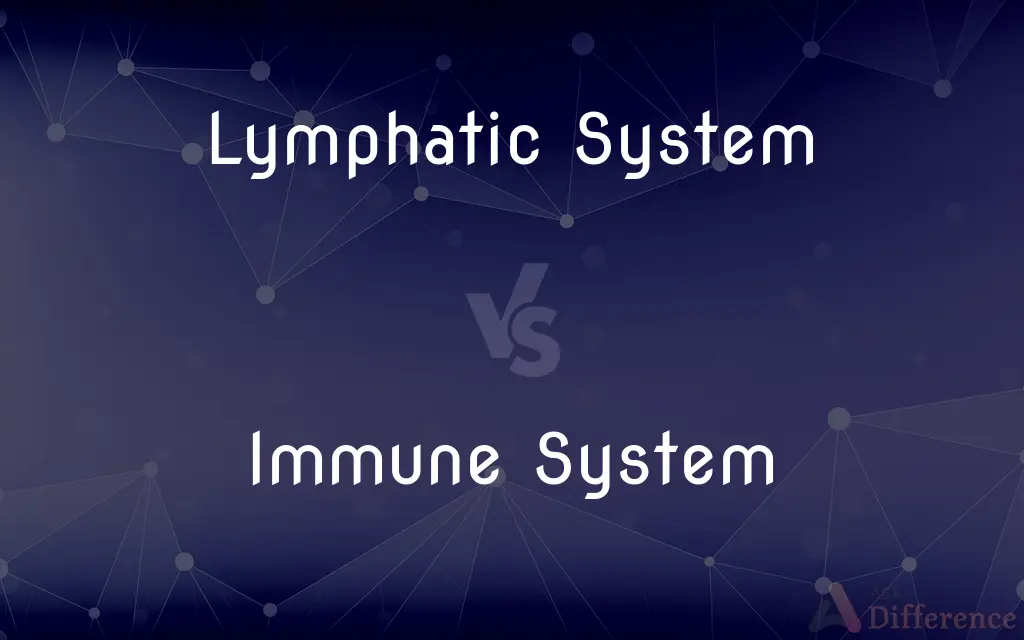Lymphatic System vs. Immune System — What's the Difference?
Edited by Tayyaba Rehman — By Fiza Rafique — Published on December 20, 2023
The Lymphatic System is a network of vessels, nodes, and organs transporting lymph and aiding fluid balance, while the Immune System is the body's defense mechanism against infections and diseases. Both interact, but serve distinct primary functions.

Difference Between Lymphatic System and Immune System
Table of Contents
ADVERTISEMENT
Key Differences
The Lymphatic System and Immune System are both vital components of the body's physiological framework. The Lymphatic System primarily serves to transport and filter lymph, a clear fluid containing white blood cells, throughout the body. In contrast, the Immune System is a broader mechanism that defends the body against harmful pathogens, such as bacteria, viruses, and other foreign invaders.
Integral to the Lymphatic System are lymph vessels, lymph nodes, and lymphoid organs. As lymph circulates, it collects waste, bacteria, and even cancer cells, which get filtered in the lymph nodes. While the Lymphatic System facilitates this crucial filtering process, the Immune System's role is more encompassing, deploying cells, proteins, and antibodies to recognize and neutralize harmful invaders.
One cannot overlook the interconnection between the Lymphatic System and Immune System. Lymphoid organs, such as the spleen and thymus, are not only part of the Lymphatic System but also play pivotal roles in the Immune System. The thymus, for instance, is where T-cells mature – these are key cells in immune responses.
The Lymphatic System's significance extends beyond merely transporting lymph. It is fundamental in maintaining bodily fluid balance, absorbing dietary fats, and providing a pathway for cells involved in immunity. Nevertheless, the Immune System encompasses a wider array of functions and components, including the innate and adaptive immune responses, which work in tandem to protect the body from potential threats.
In summary, while there's a symbiotic relationship between the Lymphatic System and Immune System, they have individual roles. The Lymphatic System focuses on fluid transport and filtration, whereas the Immune System centers on the body's defense against pathogens and potential health threats.
ADVERTISEMENT
Comparison Chart
Primary Function
Transport and filter lymph
Defend against pathogens and diseases
Components
Lymph vessels, lymph nodes, and lymphoid organs
White blood cells, antibodies, complement proteins, lymphoid organs
Response Type
Passive fluid transport and filtration
Active recognition and defense against invaders
Role in Immunity
Provides pathway for immune cells
Coordinates body's defense mechanisms
Interactions with Other Systems
Directly interacts with the circulatory system
Interacts with nearly all systems, especially when identifying and attacking pathogens
Compare with Definitions
Lymphatic System
The Lymphatic System is a network of vessels and nodes transporting lymph throughout the body.
The Lymphatic System helps in removing toxins and waste from bodily tissues.
Immune System
It's responsible for distinguishing between self and non-self molecules.
The Immune System ensures our own cells aren't attacked while targeting foreign ones.
Lymphatic System
It aids in the absorption of dietary fats from the intestine.
The Lymphatic System facilitates the transport of absorbed fats to the bloodstream.
Immune System
This system utilizes white blood cells, antibodies, and other components for defense.
The Immune System produces antibodies to neutralize harmful bacteria.
Lymphatic System
It's an essential system for maintaining fluid balance in the body.
Without the Lymphatic System, our bodies would experience swelling due to fluid buildup.
Immune System
It comprises both innate and adaptive immune responses.
The Immune System provides immediate protection through innate immunity and remembers past invaders with adaptive immunity.
Lymphatic System
This system includes lymphoid organs like the spleen and thymus.
The Lymphatic System plays a role in filtering harmful substances using lymphoid organs.
Immune System
The Immune System is the body's defense mechanism against pathogens.
When a virus enters the body, the Immune System activates to combat it.
Lymphatic System
A key role is to provide a pathway for immune cells.
The Lymphatic System ensures that immune cells can travel and reach infection sites efficiently.
Immune System
The system has a memory component, allowing quicker responses to previously encountered threats.
After getting chickenpox once, the Immune System remembers the virus, granting immunity from future infections.
Common Curiosities
How does the Lymphatic System aid the Immune System?
The Lymphatic System provides pathways for immune cells and filters potential threats.
How do vaccines work with the Immune System?
Vaccines introduce a harmless piece of a pathogen to train the Immune System to recognize and combat the actual threat.
How does the Immune System protect the body?
The Immune System defends against harmful pathogens using cells, antibodies, and proteins.
Are lymph nodes part of the Immune System or Lymphatic System?
Lymph nodes are part of the Lymphatic System, but they also play a role in the Immune System by filtering harmful substances.
Can the Lymphatic System become compromised?
Yes, infections, cancers, and surgeries can impact the Lymphatic System's functionality.
Why is the spleen essential in immunity?
It filters blood, removing damaged cells and microbes, and is a part of both the Lymphatic and Immune Systems.
Can problems in the Lymphatic System affect immunity?
Yes, if the Lymphatic System is compromised, it can lead to reduced immune responses.
What's the main function of the Lymphatic System?
The Lymphatic System primarily transports and filters lymph throughout the body.
What cells are central to the Immune System's defense mechanism?
White blood cells, especially T-cells and B-cells, are central to the Immune System's defenses.
Which system is responsible for producing antibodies?
The Immune System is responsible for antibody production.
Does the Lymphatic System interact with other bodily systems?
Absolutely, it directly interacts with the circulatory system and aids other systems by removing waste.
What role do tonsils play in the Immune System?
Tonsils are lymphoid tissues that help trap and filter bacteria and other pathogens from inhaled air.
How does the Immune System "remember" past invaders?
Memory cells in the Immune System store information about past pathogens, enabling a faster response upon re-exposure.
How does lymph form in the Lymphatic System?
Lymph forms when tissue fluid collects into lymph capillaries.
Are there diseases that specifically target the Immune System?
Yes, autoimmune diseases occur when the Immune System mistakenly attacks the body's own cells.
Share Your Discovery

Previous Comparison
Rules vs. Policies
Next Comparison
Dicot Root vs. Monocot RootAuthor Spotlight
Written by
Fiza RafiqueFiza Rafique is a skilled content writer at AskDifference.com, where she meticulously refines and enhances written pieces. Drawing from her vast editorial expertise, Fiza ensures clarity, accuracy, and precision in every article. Passionate about language, she continually seeks to elevate the quality of content for readers worldwide.
Edited by
Tayyaba RehmanTayyaba Rehman is a distinguished writer, currently serving as a primary contributor to askdifference.com. As a researcher in semantics and etymology, Tayyaba's passion for the complexity of languages and their distinctions has found a perfect home on the platform. Tayyaba delves into the intricacies of language, distinguishing between commonly confused words and phrases, thereby providing clarity for readers worldwide.












































